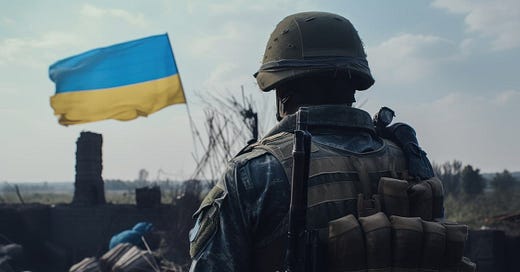On Ukraine's bid to fast-track NATO membership, Trudeau’s posture is unclear.
Heading into this week's NATO summit, Justin Trudeau’s ambiguity on the issue of fast-tracking Ukraine’s membership could force a decision to be made for Canada.
Canadian Prime Minister Justin Trudeau is heading to this week's NATO summit in Lithuania without giving Canadians or NATO allies a clear position regarding Ukraine's request for a clear, fast-tracked, pathway to membership into the alliance.
This ambiguity is problematic given the differing perspectives of Canada's NATO allies on the matter, Canada's current extreme deficit in military defense capacity, and Canada's rapidly waning influence in global affairs.
Trudeau’s government’s position on the conditions and timelines needed for Ukraine to be considered for membership into NATO has been ambiguous at best. Last week, the Globe and Mail reported that Canadian Defense Minister Anita Anand stopped short of supporting Ukraine's bid for a fast-tracked ascension stating, "when the conditions are right, we are fully supportive of Ukraine's ascension to NATO." And during a visit to Kyiv last month, Canadian Prime Minister Justin Trudeau told Ukrainian President Volodymyr Zelenskyy that Canada feels "very strongly that Ukraine should be joining NATO as soon as conditions allow."
The problem for NATO countries and Canadians is that neither Anand nor Trudeau has clearly articulated what the conditions they mentioned may be, leaving a lot of room for interpretation on what, if any, position Canada will take at the summit.
Other NATO member countries have been more explicit about their position.
Yesterday, in an interview with CNN, American President Joe Biden bluntly laid out his administration's position ahead of this week's NATO summit, stating, "I don't think there is unanimity in NATO about whether or not to bring Ukraine into the NATO family now, at this moment, in the middle of a war."
The sticking point for the Americans, who provide a significant component of NATO's allied military capacity, is Article 5 of NATO's Washington Treaty, which states that an attack on one ally is considered an attack on all allies. In that, membership of Ukraine in NATO at present would pull NATO member countries into active war with Russia. Biden alluded to this concern during his interview with CNN. Biden's national security advisor Jake Sullivan was even more blunt, stating, "we are not seeking to start World War Three."
But the United Kingdom is heading into the NATO summit with a different position than the Americans. Last week, Britain's Secretary of Defense, Ben Wallace, laid out his country's posture of supporting a fast-tracked ascension for Ukraine.
Where Trudeau stands in relation to these positions is unclear.
In past decades, Canada was known as a skilled and competent ally that could be relied upon to resolve such differences. However, heading into this week's NATO summit, Trudeau's ambiguous posture on the conditions needed for Ukraine's ascension into NATOs membership belies a lack of a coherent foreign policy that stems from two significant problems.
First, Canada is not meeting its NATO military spending commitments and has an obvious military capacity gap. These issues have increasingly become a significant bone of contention within domestic politics and Canada's allied nations. In a statement released today, Conservative Shadow Minister for Defense James Bezan reiterated this point: "Canada's stature as a trusted and reliable NATO partner has been diminished under the Trudeau government. After eight years of Justin Trudeau, our military is in a state of disrepair. The Trudeau government has spent the cupboards bare, maxing out spending in every government department – except national defense."
Additionally, the fact that Canada has had five Foreign Affairs ministers in the time that Trudeau has been in power has left Canada with fragmented and incoherent postures on numerous foreign policy issues. The current Minister, Melanie Joly, has been conspicuously quiet on Ukraine's request for fast-tracked membership into NATO, as have all previous office holders currently serving in Trudeau's cabinet (including Deputy Prime Minister Chrystia Freeland).
So, lacking a coherent vision for Canada's role in the world and any significant military capacity, Trudeau seems to be entering a contentious NATO summit with the strategy of seeing where the winds will blow and avoiding taking any firm position.
However, with global geopolitics rapidly changing, Canada will likely have a position given to it by other, more focused, nations instead of being firmly in control of the outcome. It also means Canadians will have less say in how global affairs impact their lives and long-term future. In that, Canada's lack of foreign policy vision and lack of military capacity equates to a lack of sovereignty.
Suppose Trudeau can't turn his leading of Canada's slide into geopolitical irrelevancy around quickly. His legacy on his infamous "Canada is back" statement might be permanently remembered as "back on the sidelines."
That is a shameful legacy that benefits no one.




